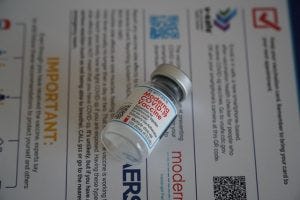
An investigation has found an incorrectly assembled production line at Spanish CDMO Rovi led to the presence of foreign particles in a lot of Moderna’s COVID-19 vaccine.
In August, Japan put on hold the rollout of 1.6 million doses of Moderna’s vaccine after “foreign materials” were discovered in approximately 565,000 vials.
Moderna and Takeda Pharmaceuticals, which distributes the vaccine in Japan, pointed the finger at contract development manufacturing organization (CDMO) Laboratorios Farmacéuticos Rovi, and this week confirmed the issue stemmed from its commercial fill-finish and packaging site in Madrid, Spain following an investigation.

Photo by Ian Hutchinson on Unsplash
The report, based on an audit of Rovi conducted on-site by Moderna and Takeda, found the most probable cause of the presence of 316L stainless steel particles in one of the recalled lots was related to friction between two pieces of metal installed in the stoppering module of the production line.
“This was the result of incorrect assembly and was due to human error specific to visually misjudging the required 1mm gap between the star-wheel and the stopper,” the firms said.
“The investigation conclusion has confirmed the scope of the event, and corrective actions-including improvements to standard operating procedures at the changeover, and the utilization of a new precision tool-will help mitigate the risk of this issue reoccurring.
“These actions will be directly overseen and confirmed by Moderna, in collaboration with Takeda. A list of corrective and preventive actions following the root cause analysis and for-cause audit are provided in the investigation report.”
The firms added the particulate matter “presented no undue risk to patient safety and did not adversely affect the benefit/risk profile of the product.”
About the Author
You May Also Like

schedl_b_and_w.jpg?width=100&auto=webp&quality=80&disable=upscale)
schedl_b_and_w.jpg?width=400&auto=webp&quality=80&disable=upscale)


